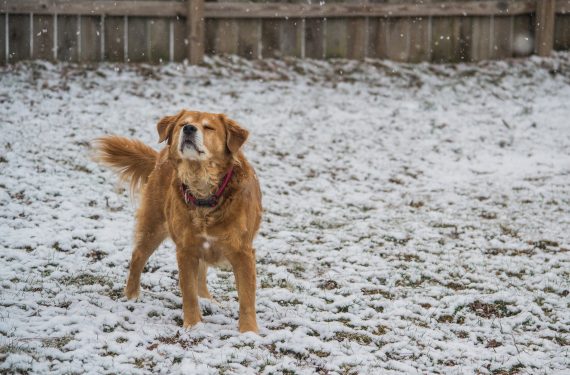21 Ways To Help Your Dog Cope With Winter

Helping your dog cope with winter should be a priority for dog owners at this time of year.
Here are 21 ways you and your pooch can be as prepared for the winter months as possible.
1. Dogs feel the cold just like humans do. If you are cold when you’re walking them, there’s a good chance they will be cold too. Try to limit their exposure to the cold by moving playtime indoors and keeping the outside for toilet breaks and exercise.
2. Consider buying your dog a coat. Long-haired dogs will not feel the cold as much as short-haired dogs, but if the temperatures are low, keep in mind that their thick fur only provides them with a certain amount of insulation. A dog coat can be a great option to add an extra layer. Always measure up correctly as you do not want it to be too tight however you still need a snug fit. Avoid coats with zips or anything that can be a choking risk. Never force your dog to wear a coat if they clearly don’t like it.
3. The age of your dog also needs to be taken into consideration. Elderly dogs will feel the cold more than younger dogs and puppies so avoid keeping them outside for too long in cold temperatures.
4. Check your dog’s paws after a winter walk. Not only are they at risk of frost bite, ground frost can hide dangers such as glass, so always check for cuts or damage. If you notice the paws are too dry, pop into WitsEnd as we have an excellent pad moisturiser in our shop.
5. Take shorter, more regular walks. Keeping walks short can minimise the effects of the cold. Sensitive areas such as ears, nose, tail and paws can all be susceptible to frost bite if they are exposed to freezing temperatures for a long time.
6. Provide a warm and cosy place for your dog to sleep. If your dog sleeps somewhere draughty, consider buying them a self-warming pet mat which warms up using the body heat from the dog.
7. Always supervise your dog outside.
8. Watch out for symptoms of hypothermia. Mild symptoms include weakness, lethargy and shivering. However, if your dog becomes unresponsive, their heart rate could slow down. If this happens, take your dog to the vet immediately and keep them warm.
9. Be careful around fires and never leave a dog unattended near an open fire.
10. Keep dogs away from anti-freeze as it is poisonous to them.
11. If you cannot take them out for regular walks due to the weather, keep them active indoors by playing games. Always keep them stimulated by providing them with a snuffle mat and plenty of toys.
12. Consider your own health too. If you’re elderly and don’t feel up to it, make other arrangements or let them use the garden.
13. Keep your dog on the lead if you are walking at night.
14. Consider buying a light-up collar, lead and ball as well as high visibility clothing for dog and owner for night-time walks, to improve visibility as much as possible.
15. Stick to well-lit paths wherever you can.
16. Avoid walking near frozen water. Not only could the ice break and your dog fall into the freezing water, but they could hurt themselves on the broken ice too.
17. If your dog is staying inside a lot more, cut back on their food intake to avoid weight gain.
18. Carry a torch with you when going on night-time walks.
19. Wherever possible, go for winter walks with a group. Not only is it safer, the dogs can enjoy playing together.
20. Avoid leaving your dog in a car for any length of time in the winter. The car will quickly turn very cold.
21. If you are going on a long walk with your dog make sure you have the means to contact somebody and let people know where you are.
Winter can be an extremely fun time with your family and dog – but it is important for all of you to remain safe during the cold weather.
For advice on dog care, training, behaviour therapy and more, please visit our articles page which is full of free advice.